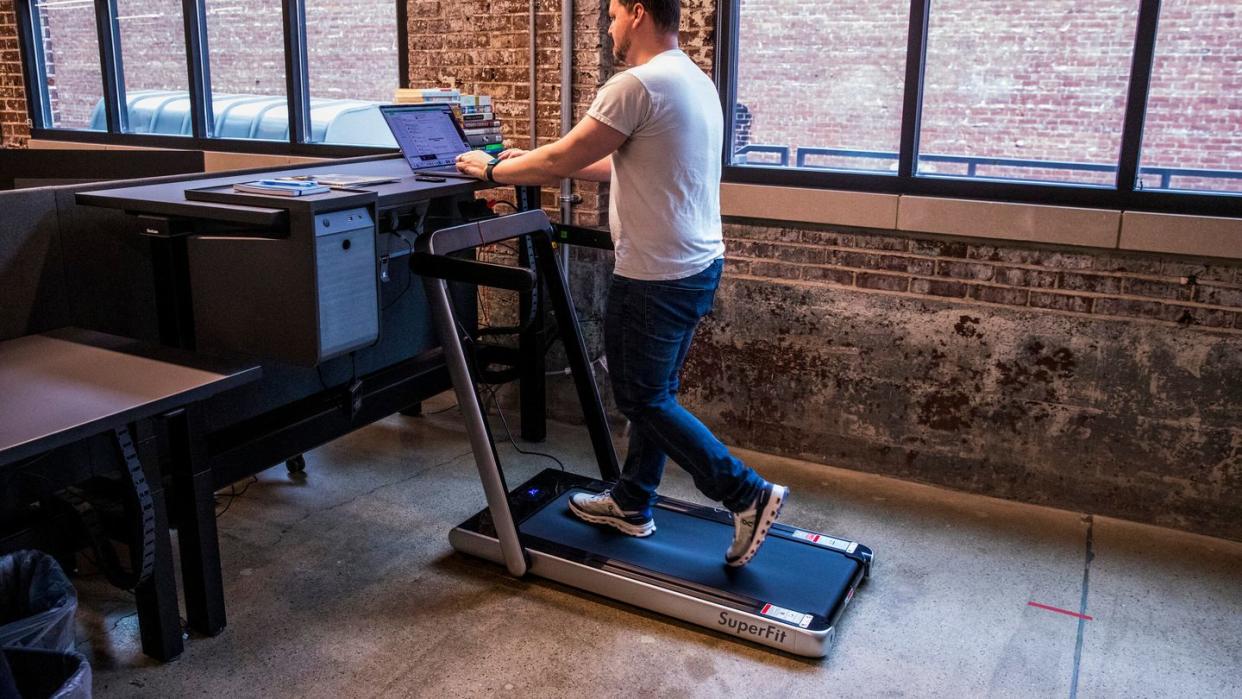Want Boosted Brain Power? Walk While You Work

"Hearst Magazines and Yahoo may earn commission or revenue on some items through these links."
A recent clinical trial examined the benefits of staying active at work, as other research has found a link between sedentary behavior and higher risk for chronic disease.
Researchers found that those who used active workstations performed better on cognitive function tests.
This is particularly helpful for those who work desk jobs, even if you ride outside of work hours.
Being sedentary throughout the workday has long been criticized for its effects on health, especially in terms of heart function. But sitting too much is tough on your brain as well. Here’s one strategy that might work for both body and mind: turning to active workstations.
A recent clinical trial published in the Journal of the American Heart Association noted that extended sedentary behavior is a risk factor for chronic disease, even for those who exercise regularly outside of the workday (looking at you, cyclists who work a desk job!). To determine the effects of being more active at a job, researchers set up active workstations at an employee wellness center, focusing on standing desks, treadmills, and step machines, and using them for 45 to 55 minutes a day.
After asking 44 participants to use these workstations on four consecutive days, researchers reported there was no significant difference in typing ability—meaning that just because you’re walking or stepping, work performance doesn’t sputter—but scores on cognitive function tests improved with each subsequent day. These tests included evaluation of reasoning, memory, focus, and fine motor skills.
Researchers acknowledged that the short timeframe is a limitation of the study, so it’s unknown whether these cognitive improvements would continue in the long-term. However, they did conclude that it seems active workstations could be a fundamental way to decrease sedentary time, providing advantages for cardiometabolic conditions as well as cognitive performance.
Research Suggests Reduce Sitting Time By One Hour to Improve Health

Don’t Be Afraid to Lift Heavy! Research Confirms the Benefits

The Amount of Leafy Greens You Need to Keep Your Heart Healthy

Spending Time in Nature Influences Your Food Choices, Says Research

Study Shows Cutting Back on Social Media Boosts Mental Health

Just 8 Weeks of Sprint Training Can Boost Your Power, Research Suggests

Morning vs. Evening Exercise Yields Different Results, Study Says

Skipping Breakfast May Leave You Short on Important Nutrients, New Research Shows

For a Healthier Gut, Eat More of These Types of Foods

What if your boss isn’t ordering stair steppers and treadmill desks, though? The good news is that previous studies have suggested that setting a schedule where you move more often can give you a brain boost—no matter what your workstation looks like.
For example, a meta-analysis in Sports Medicine looking at 32 studies on healthy but generally inactive adults found that brief bouts of movement—like just walking briskly around an office for five minutes—improved health outcomes related to cardiovascular function, which could have a beneficial effect on mental function.
Another meta-analysis, published in Frontiers in Psychology, noted that physical exercise affects brain plasticity, which influences cognition and feelings of wellbeing. That means even short bursts of movement can literally change the structure of your brain in ways that improve function. Those researchers added that the biggest advantages tend to come with activity that is structured, planned, and repeated, rather than just moving around whenever you have the chance.
Because of that, creating a consistent routine at your workplace for physical activity can be crucial for keeping your brain sharp, according to Loretta Graziano Breuning, Ph.D., author of Habits of a Happy Brain.
“The brain tends to crave predictability, because then it can anticipate what’s next,” she told Bicycling. That’s why a bedtime routine works so well, she added—your brain becomes programmed by that set of habits to prepare for sleep.
“In the same way, being active during a workday on a predictable schedule can lead to your brain firing up as that exercise period approaches,” Breuning said, adding that this might be particularly helpful for those who sit for long stretches even when exercising, such as cyclists. “That can improve cognitive performance overall, as well as provide a mood lift, which is always something the brain craves, no matter what you’re doing.”
You Might Also Like
